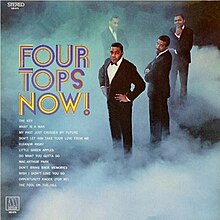| Four Tops Now! | ||||
|---|---|---|---|---|
 | ||||
| Studio album by | ||||
| Released | March 1969 | |||
| Genre | Soul music | |||
| Length | 41:08 | |||
| Language | English | |||
| Label | Motown | |||
| Four Tops chronology | ||||
| ||||
Four Tops Now! is the seventh studio album by American soul music vocal group Four Tops, released by Motown.
| Four Tops Now! | ||||
|---|---|---|---|---|
 | ||||
| Studio album by | ||||
| Released | March 1969 | |||
| Genre | Soul music | |||
| Length | 41:08 | |||
| Language | English | |||
| Label | Motown | |||
| Four Tops chronology | ||||
| ||||
Four Tops Now! is the seventh studio album by American soul music vocal group Four Tops, released by Motown.
Editors at AllMusic Guide scored this album three out of five stars, with critic Ron Wynn characterizing it as not "among their biggest hit albums, but was a well-produced, nicely sung set anyhow". [1] The 1992 edition of The Rolling Stone Album Guide rated this release three out of five stars. [2]
Four Tops
Additional personnel
Four Tops Now! peaked at 74 on the Billboard 200 and reached 18 on the R&B charts. [3]